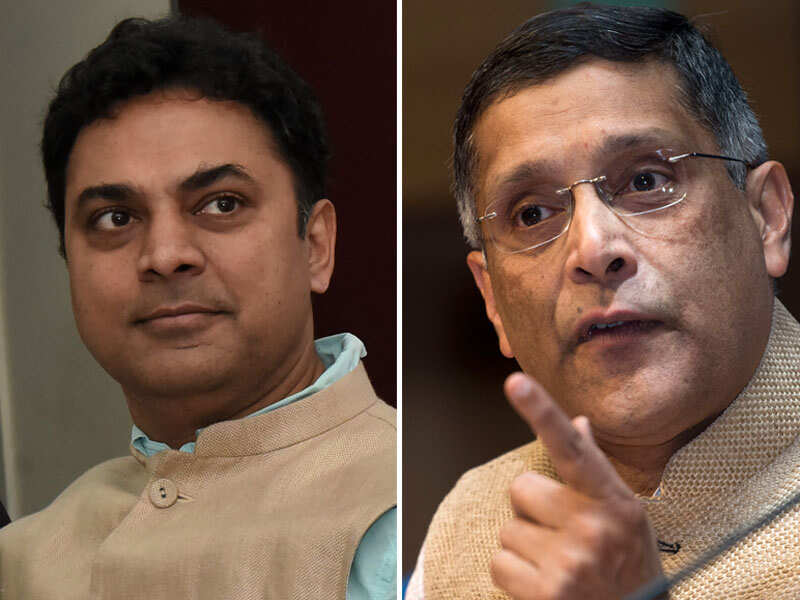Key points of Economic Survey 2018-19
Highlights
- The Economic Survey suggested that India's GDP (gross domestic product) is projected to grow at a rate of 7 per cent in the fiscal year 2019-20
- The survey views the economy as either being in a virtuous or a vicious cycle and never in equilibrium
 Finance minister Nirmala Sitharaman with MoS Anurag Thakur and other officials after giving final touches to t... Read More
Finance minister Nirmala Sitharaman with MoS Anurag Thakur and other officials after giving final touches to t... Read MoreNEW DELHI: Finance minister Nirmala Sitharaman released the Economic Survey 2018-19 in the Parliament on Thursday, a day before presenting her maiden annual Budget.
The Economic Survey suggested that India's GDP (gross domestic product) is projected to grow at a rate of 7 per cent in the fiscal year 2019-20. Prepared by chief economic adviser Krishnamurthy Subramanian, it laid out the ambitious agenda of applying principles of behavioural economics to achieve and sustain real gross domestic product (GDP) growth of 8 per cent, to make India a $5 trillion economy by 2024-25.
Here are few highlights of the Economic Survey 2018-19:
1) The survey departs from the traditional thinking. It views the economy as either being in a virtuous or a vicious cycle and never in equilibrium.
2) Citing China's example, K Subramanian said investment as a percentage of GDP has to be in excess of 30 per cent. He added that the government needs to start investing close to 35 per cent. Investment, especially private investment is the 'key driver' that drives demand, creates capacity, increases labour productivity, introduces new technology, allows creative destruction, and generates jobs.
3) The survey called for predictable actions from policy-makers and use of labels such as 'Standstill' versus 'Ratchet up' to categorise various policies as a measure to reduce economic policy uncertainity and ensure a stable investment climate.
4) Marginal cost of data has declined has declined exponentially while its marginal benefit to society has increased manifold, the survey said. It endeavours to create data as a public good while considering the privacy implications and inherent fairness of data being used.
5) Terming highways as a catalyst for economic growth, the survey said private investment in the sector remained 'tardy' as investors are interested in putting their money on a short-term basis. Even though the investment in highways has grown more than three times to Rs 1.58 lakh crore in 2018-19 availability of funds for financing large projects remains a bottleneck, the survey added.
6) The survey suggested that private sector be granted access to 'select' databases for commercial use on a chargeable basis, to ease pressure on government finances. It also recommended sale of some datasets to analytics agencies to help them predict demand, discover untapped markets or innovate new products. A full chapter has been dedicated to data where it is asserted that data "of the people,, by the people, for the people" must become the mantra for the government.
7) Deregulating labour law restrictions can significantly create more number of jobs in the economy, the key document said referring to the example of Rajasthan where labour reforms where introduced in 2014.
8) The survey states that Indian economy is set to witness a sharp slowdown in population growth in the next two decades. Population projection at the national and state level up to 20141 shows that India has entered the next stage of demographic transition. This is mainly due to rapid decline in the total fertility rate (TFR) in recent decades, which is expected to be below replacement level fertility by 2021.
9) Another key suggestion given by the survey is invoking the doctrine of 'pious obligation' as well as blending principles of behavioural economics with spiritual norm to tackle tax evasion and wilful defaults.
10) The survey also highlighted the vision for electric vehicle mobility in the country, stating that EVs hold enormous potential not only because they are envirnoment friendly but also because India can emerge as a hub for EV market, thereby generating employment and growth opportunities.
11) India continues to lag on the indicator for enforcing contracts, climbing one rank from 164 to 163 in the latest Ease of Doing Business Report, 2018. The survey suggested clearing backlog in courts by reducing the number of holidays, and appointing more judges to enhance productivity of the judicial system. As per the survey, 3.5 crore cases are pending in the judicial system, much of which are concentrated in the district and subordinate courts.
12) The survey outlined the substantial progress made by the government on women empowerment, social protection schemes, education, health and skilling & employment by initiating many plans for these sectors. Several programs like Beti Bachao, Beti Padhao (BBBP), Ujjwala Scheme, Poshan Abhiyaan, Pradhan Mantri Matra Vandara Yojana, etc. have been initiated to mainstream women and make women active agents of change in the society, the survey said.
13) The Economic Survey outlined the progress made in the Swachh Bharat Mission (SBM) that was initiated in 2014 to achieve universal sanitation coverage by October 2, 2019. Over 9.5 crore toilets have been built all over the country and 564,658 villages have been declared open-defecation free (ODF).
14) Devising policies to benefit farmers by improving water usage, should become a national priority, the survey suggested. Focus should shift from 'land productivity' to 'irrigation water productivity'and thrust should be on micro-irrigation that can improve water use efficiency, it further stated.
(With agency inputs)
The Economic Survey suggested that India's GDP (gross domestic product) is projected to grow at a rate of 7 per cent in the fiscal year 2019-20. Prepared by chief economic adviser Krishnamurthy Subramanian, it laid out the ambitious agenda of applying principles of behavioural economics to achieve and sustain real gross domestic product (GDP) growth of 8 per cent, to make India a $5 trillion economy by 2024-25.
Here are few highlights of the Economic Survey 2018-19:
1) The survey departs from the traditional thinking. It views the economy as either being in a virtuous or a vicious cycle and never in equilibrium.
2) Citing China's example, K Subramanian said investment as a percentage of GDP has to be in excess of 30 per cent. He added that the government needs to start investing close to 35 per cent. Investment, especially private investment is the 'key driver' that drives demand, creates capacity, increases labour productivity, introduces new technology, allows creative destruction, and generates jobs.
3) The survey called for predictable actions from policy-makers and use of labels such as 'Standstill' versus 'Ratchet up' to categorise various policies as a measure to reduce economic policy uncertainity and ensure a stable investment climate.
4) Marginal cost of data has declined has declined exponentially while its marginal benefit to society has increased manifold, the survey said. It endeavours to create data as a public good while considering the privacy implications and inherent fairness of data being used.
5) Terming highways as a catalyst for economic growth, the survey said private investment in the sector remained 'tardy' as investors are interested in putting their money on a short-term basis. Even though the investment in highways has grown more than three times to Rs 1.58 lakh crore in 2018-19 availability of funds for financing large projects remains a bottleneck, the survey added.
6) The survey suggested that private sector be granted access to 'select' databases for commercial use on a chargeable basis, to ease pressure on government finances. It also recommended sale of some datasets to analytics agencies to help them predict demand, discover untapped markets or innovate new products. A full chapter has been dedicated to data where it is asserted that data "of the people,, by the people, for the people" must become the mantra for the government.
7) Deregulating labour law restrictions can significantly create more number of jobs in the economy, the key document said referring to the example of Rajasthan where labour reforms where introduced in 2014.
8) The survey states that Indian economy is set to witness a sharp slowdown in population growth in the next two decades. Population projection at the national and state level up to 20141 shows that India has entered the next stage of demographic transition. This is mainly due to rapid decline in the total fertility rate (TFR) in recent decades, which is expected to be below replacement level fertility by 2021.
9) Another key suggestion given by the survey is invoking the doctrine of 'pious obligation' as well as blending principles of behavioural economics with spiritual norm to tackle tax evasion and wilful defaults.
10) The survey also highlighted the vision for electric vehicle mobility in the country, stating that EVs hold enormous potential not only because they are envirnoment friendly but also because India can emerge as a hub for EV market, thereby generating employment and growth opportunities.
11) India continues to lag on the indicator for enforcing contracts, climbing one rank from 164 to 163 in the latest Ease of Doing Business Report, 2018. The survey suggested clearing backlog in courts by reducing the number of holidays, and appointing more judges to enhance productivity of the judicial system. As per the survey, 3.5 crore cases are pending in the judicial system, much of which are concentrated in the district and subordinate courts.
12) The survey outlined the substantial progress made by the government on women empowerment, social protection schemes, education, health and skilling & employment by initiating many plans for these sectors. Several programs like Beti Bachao, Beti Padhao (BBBP), Ujjwala Scheme, Poshan Abhiyaan, Pradhan Mantri Matra Vandara Yojana, etc. have been initiated to mainstream women and make women active agents of change in the society, the survey said.
13) The Economic Survey outlined the progress made in the Swachh Bharat Mission (SBM) that was initiated in 2014 to achieve universal sanitation coverage by October 2, 2019. Over 9.5 crore toilets have been built all over the country and 564,658 villages have been declared open-defecation free (ODF).
14) Devising policies to benefit farmers by improving water usage, should become a national priority, the survey suggested. Focus should shift from 'land productivity' to 'irrigation water productivity'and thrust should be on micro-irrigation that can improve water use efficiency, it further stated.
(With agency inputs)
Download The Times of India News App for Latest Business News.






































All Comments ()+^ Back to Top
Refrain from posting comments that are obscene, defamatory or inflammatory, and do not indulge in personal attacks, name calling or inciting hatred against any community. Help us delete comments that do not follow these guidelines by marking them offensive. Let's work together to keep the conversation civil.
HIDE